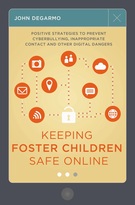
Years ago, when I was a foster parent to a 17 year old, whom I named ‘Helena’ in my book Fostering Love: One Foster Parent’s Journey, I happened to find her on the social network site, MySpace. At that time, I was not very familiar with social networking, or the benefits and dangers that are associated with them for foster children. Children in foster care are like other children from across the globe in that they enjoy social networking, and use social networking sites to seek out friends, family, and fun In truth, online communication networking has become a focal point for today’s social interactivity. For foster children, sites like Facebook and other social network sites have the additional bonus of allowing them to hide from their own realities, creating an identity of their own. These created identities are more like an imaginary world for them; a dream world where they can escape their foster care centered lives and instead pretend to be a normal child from what they perceive to be a normal family.
Social network sites allow children in foster care to create their own identities and personas, identities that do not include the term “foster care.” Through the use of social networking sites, foster children can pick and choose who their network friends are, and more importantly, can express themselves however they may wish to, without fear of reprisal. If they are angry with their teachers, disappointed with their case managers, or sad about having foster parents, social network sites are venues where they tell others.
Join the thousands who receive Dr. DeGarmo’s FREE foster care newsletter. Simply fill out the form below.
Whether it is finding the latest and most relevant learning resources for educational purposes, researching for information to better aid a foster child’s challenges, staying in contact with birth sibling or friends who live further away following different placements, there are many advantages for both foster child and foster parent alike with online technology. Indeed, digital technology has opened up a whole new world for all involved in foster care; a world that can be both wonderful and dangerous at the same time. In order to fully benefit from these advantages, foster parents must ensure that their foster child are safe from the many dangers and threats that face the child in this digital world of the 21st century. As a foster parent of over 45 children, I recognize this danger daily, and is the main reason why I wrote the book Keeping Foster Children Safe Online (Jessica Kingsley Publishers).
One foster parent told me a recent conference I was speaking at that she was concerned about violating her foster child’s privacy, and was worried that she might be disciplined by the child welfare agent for spying on the child. I assured her that what she was doing was in fact ensuring that the foster child’s privacy was protected, and that she was not spying, she was looking after the child’s safety and security. You have the responsibility as a foster parent to make certain that your foster child is not contacted by online predators, stalked by biological family members, attacked by cyberbullies, or stumble across sites that are dangerous and inappropriate for his age. By checking your foster child’s online device and cell phone on a regular basis, you are helping to protect the child, and the child’s privacy.
Without a doubt, online technology and social networking offer many benefits for children in foster care, and can help to keep families and friendships united. For the fifteen year old foster child who wants to stay connected with her older sister and friends, it is a wonderful tool to do so, and will go a long way for helping this teen deal with some of the pain she is most likely facing from being moved from home to home. Yet, foster parents need to be diligent and consistent in protecting their child from the dangers that are online. To be sure, it can be a difficult and exhausting task, but not doing so will be even more difficult, and perhaps even dangerous.
Dr. John DeGarmo
May, 2014
For more, purchase Dr. DeGarmo’s new book Keeping Foster Children Safe Online: Positive Strategies to Prevent Cyberbullying, Inappropriate Contact, and Other Digital Dangers.


 RSS Feed
RSS Feed